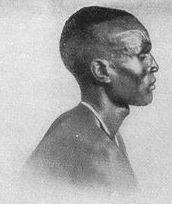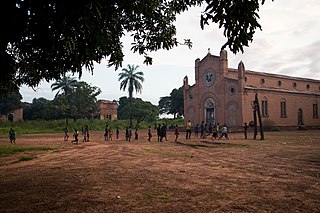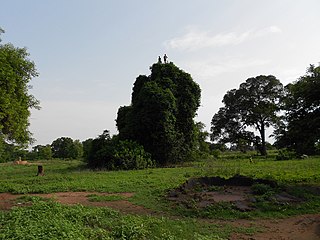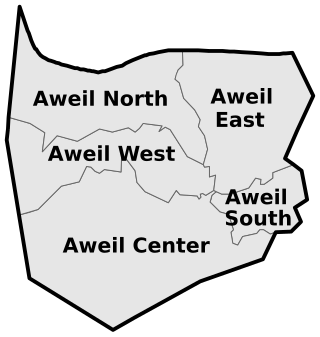
Proto-Indo-European mythology is the body of myths and deities associated with the Proto-Indo-Europeans, speakers of the hypothesized Proto-Indo-European language. Although the mythological motifs are not directly attested – since Proto-Indo-European speakers lived in preliterate societies – scholars of comparative mythology have reconstructed details from inherited similarities in mythological concepts found in Indo-European languages, based on the assumption that parts of the Proto-Indo-Europeans' original belief systems survived in the daughter traditions.

The Dinka people are a Nilotic ethnic group native to South Sudan. The Dinka mostly live along the Nile, from Mangalla-Bor to Renk, in the region of Bahr el Ghazal, Upper Nile, and the Abyei Area of the Ngok Dinka in South Sudan.

Bor is a historic city in the Bor region of Jonglei State, located in the central region of South Sudan. It has also served as the headquarters of Jonglei state. The city is situated on the east side of the White Nile at the southern extent of the sudd, South Sudan's vast central wetlands.

The Luo of Kenya and Tanzania are a Nilotic ethnic group native to western Kenya and the Mara Region of northern Tanzania in East Africa. The Luo are the fourth-largest ethnic group (10.65%) in Kenya, after the Kikuyu (17.13%), the Luhya (14.35%) and the Kalenjin (13.37%). The Tanzanian Luo population was estimated at 1.1 million in 2001 and 3.4 million in 2020. They are part of a larger group of related Luo peoples who inhabit an area ranging from South Sudan, southwestern Ethiopia, northern and eastern Uganda, southwestern Kenya, and northern Tanzania, making them one of the largest ethnic groups in East Africa.

The Hawiye are one of the principal and largest of the Somali clans, tracing their lineage back to Sheikh Ahmed Bin Abdulrahman Bin Uthman, also known as Sheikh Hawiye, the eponymous figure of the clan. They are considered the earliest documented clan to have settled in the Somali peninsula, as noted in the 12th century by Al-Idrisi, occupying the regions spanning from Ras Hafun to Merca, which served as their capital. Presently, the Hawiye reside in central and southern Somalia, Somaliland, Djibouti, the Somali region of Ethiopia, Harar, Oromia, and Afar regions, as well as Kenya. Furthermore, they represent the majority of the population in the capital city of Mogadishu.

The Lost Boys of Sudan refers to a group of over 20,000 boys of the Nuer and Dinka ethnic groups who were displaced or orphaned during the Second Sudanese Civil War (1987–2005). Two million were killed and others were severely affected by the conflict. The term was used by healthcare workers in the refugee camps and may have been derived from the children's story of Peter Pan by J. M. Barrie. The term was also extended to refer to children who fled the post-independence violence in South Sudan in 2011–2013.

Deim Zubeir, from the Arabic ديم الزبير ["Daim az-Zubayr"], commonly translated as the "Camp of Zubeir", is the historically established but highly controversial name of Uyujuku town in the Western Bahr el Ghazal of the Republic of South Sudan, located in the Western Bahr El Ghazal part of the country, some 70 km from the border with the Central African Republic (CAR), near the Biri tributary of the River Chel.

Tonj is a town located in Warrap State, in the Bahr el Ghazal region of South Sudan. It is known by various names, including Kalkuel, Genanyuon, Jurkatac, Madiera, Genngeu, and Tonjdit. The town is bordered by Rumbek, Cueibet, Yambio, Bentiu, and Gogrial. As of 2010, its population is 17,340.

Mongalla or Mangalla is a Payam in Juba County, Central Equatoria State in South Sudan, on the east side of the Bahr al Jebel or White Nile river. It lies about 75 km by road northeast of Juba. The towns of Terekeka and Bor lie downstream, north of Mongalla.
Ethnic violence in South Sudan has a long history among South Sudan's varied ethnic groups. South Sudan has 64 tribes with the largest being the Dinka, who constitute about 35% of the population and predominate in government. The second largest are the Nuers. Conflict is often aggravated among nomadic groups over the issue of cattle and grazing land and is part of the wider Sudanese nomadic conflicts.

The South Sudanese Civil War was a multi-sided civil war in South Sudan fought from 2013 to 2020, between forces of the government and opposition forces. The Civil War caused rampant human rights abuses, including forced displacement, ethnic massacres, and killings of journalists by various parties. Since its end South Sudan has been governed by a coalition formed by leaders of the former warring factions, Salva Kiir Mayardit and Riek Machar. The country continues to recover from the war while experiencing ongoing and systemic ethnic violence.
Ngok Lual Yak is an African sub-tribe, within the Jiëŋ (Dinka) group. They are mainly found in Malakal, South Sudan and inhabit the land along the confluences of the Nile and Sobat rivers. It is believed that the sub-tribe numbers about 95,000. They are devoted ethnics and believe in Deŋdit as their provider. Some of Ngok sections are part of Bor Community and sections who identifies themselves as descendants of Ngok could still be traced!
Baidit is a Payam in Bor West County, in Jonglei State, South Sudan. It is situated on the east side of the Bahr al Jabal River a short distance north of Bor, South Sudan. Baidit is the county headquarters for Bor West County.

Yirol East County is a county in Lakes State, South Sudan. The county borders Panyijar County in the North, Rumbek East County in the North west, Yirol West County in the west, Awerial County in the south, Bor South County in the south east and Twic East County in the east. Shambe National Park as well as Ramciel are located in Yirol East County.

Aweil South County, sometimes called Paliet, is an administrative area in Northern Bahr el Ghazal state, in the Bahr el Ghazal region of South Sudan, bordering Warrap State to the south. It is located in the southeastern part of NBGs. It is also known by the name Paliet, and one of the counties consisting of three major Dinka tribal groups: Ajak, Boncuai and Kongdeer. It was founded in 2000 and headquartered in Boncuai in a place called Mangar-Gier. In 2004, the headquarters were shifted to Malek Alel in Ajak. It is bordered to the north by Aweil East and to the west by Aweil Centre, to the south east by Gogrial State, and to the southwest by Western Barh el Ghazal state respectively.
This article lists events from the year 2019 in South Sudan
Anuet payam is an independent payam situated at Bor South County in Jonglei State within South Sudan. Previously, Anuet village used to fall under Pariak boma in former Kolnyang payam.
Bona Malwal Madut Ring is a South Sudanese journalist, politician, and government official known for his advocacy for self-determination and secession for South Sudan. From the Dinka ethnic group, he pursued his education in journalism and economics in the United States, earning degrees from Indiana University and Columbia University. His career transitioned from an early stint as an Information Officer to journalism, including Editor-In-Chief positions at various Sudanese newspapers including the Southern Front's mouthpiece, The Vigilant.
The Nuer massacre, which occurred from December 15 to December 18, 2013, was a well-organized, intentional mass killing perpetrated against thousands of Nuer civilians by Dinka SPLA soldiers, Presidential Guard - Tiger Division, and Mathiang Anyoor, supported by Uganda People's Defence Forces (UPDF), orchestrated by the President of the Republic of South Sudan Salva Kiir Mayardit, Jieng Council of Elders (JCE), and Dinka high-ranking military generals within the SPLA army in Juba. More than 47,000 Nuer civilians were massacred in four days between December 15 and December 18, 2013. A couple of years later, the death toll was projected to be over 50,000 Nuer civilians as fighting rapidly engulfed the entire region of the Upper Nile.

Ngundeng Pyramid, also known as Pyramid of Dengkur, was a large mound shrine constructed by the Nuer people's prophet Ngundeng Bong at the end of the nineteenth century and added to by his son Guek Ngundeng. The Ngundeng Pyramid, which was around 300 feet in circumference and 50 to 60 feet tall, cone-shaped, and encircled by a row of elephant tusks, was a symbol of the Nuer people's resistance to colonialism. The monument was dynamited on the orders of British colonial commander Percy Coriat in 1928, shortly after the first attempt to demolish it failed.












